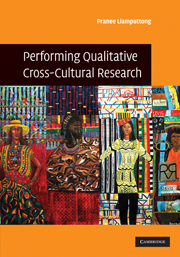Book contents
- Frontmatter
- Contents
- Preface
- About the author
- About the book
- 1 Performing qualitative cross-cultural research: an introduction
- 2 Moral and ethical perspectives
- 3 The research participants: accessing and reciprocity
- 4 Cultural sensitivity: a responsible researcher
- 5 Insider/Outsider perspectives and placing issues
- 6 Cross-cultural communication and language issues
- 7 Personal and collective testimony
- 8 Local knowledge, local power and collective action
- 9 Writing and disseminating in cross-cultural research
- In closing …
- References
- Index
- References
1 - Performing qualitative cross-cultural research: an introduction
Published online by Cambridge University Press: 05 June 2012
- Frontmatter
- Contents
- Preface
- About the author
- About the book
- 1 Performing qualitative cross-cultural research: an introduction
- 2 Moral and ethical perspectives
- 3 The research participants: accessing and reciprocity
- 4 Cultural sensitivity: a responsible researcher
- 5 Insider/Outsider perspectives and placing issues
- 6 Cross-cultural communication and language issues
- 7 Personal and collective testimony
- 8 Local knowledge, local power and collective action
- 9 Writing and disseminating in cross-cultural research
- In closing …
- References
- Index
- References
Summary
From the vantage point of the colonized, a position from which I write … the term ‘research’ is inextricably linked to European imperialism and colonialism. The word itself, ‘research’, is probably one of the dirtiest words in the indigenous world's vocabulary … It stirs up silence, it conjures up bad memories, it raises a smile that is knowing and distrustful.
(Smith 1999: 1)Research by its very nature is inherently political; it is about the nature of power as well as access to power … The academy has been dominated by White middle-class and/or male researchers, whose political values and commitments have influenced social research, leading it to be predominantly Eurocentric, bourgeois and patriarchal in its agenda … This agenda has been informed primarily by the dominant groups, such that the ‘marginal’, the ‘powerless’ and the ‘oppressed’ have been the excessive object of study.
(Mirza 1998: 80)Introduction
Historically, cross-cultural research has been an important part of the anthropological discipline. Researchers within this discipline have worked with people in different social, cultural and geographical settings, using mainly ethnography as their method of data collection. They are known as ethnographers. They have tried to conduct their research with the hope that they can ‘interpret what is on the “inside”, through the voices of informants’ (Adler 2004: 107). This tradition continues. Although the ethnographers are performing cross-cultural research, in the past they have also been seen as the ‘takers and users’ who ‘exploit the hospitality and generosity of native people’ (Trask 1993: 7; see also Minh-Ha 1989, 2006).
- Type
- Chapter
- Information
- Performing Qualitative Cross-Cultural Research , pp. 1 - 30Publisher: Cambridge University PressPrint publication year: 2010



